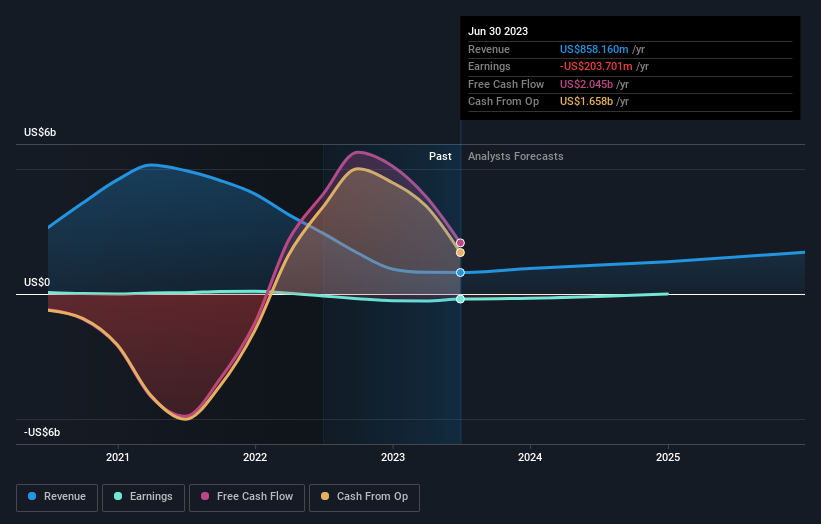Stock Analysis
- United States
- /
- Diversified Financial
- /
- NYSE:LDI
Private equity firms invested in loanDepot, Inc. (NYSE:LDI) copped the brunt of last week's US$32m market cap decline

Key Insights
- loanDepot's significant private equity firms ownership suggests that the key decisions are influenced by shareholders from the larger public
- 57% of the company is held by a single shareholder (PCP Managers, L.P.)
- Insiders have bought recently
To get a sense of who is truly in control of loanDepot, Inc. (NYSE:LDI), it is important to understand the ownership structure of the business. The group holding the most number of shares in the company, around 57% to be precise, is private equity firms. In other words, the group stands to gain the most (or lose the most) from their investment into the company.
As a result, private equity firms as a group endured the highest losses last week after market cap fell by US$32m.
In the chart below, we zoom in on the different ownership groups of loanDepot.
Check out our latest analysis for loanDepot

What Does The Institutional Ownership Tell Us About loanDepot?
Many institutions measure their performance against an index that approximates the local market. So they usually pay more attention to companies that are included in major indices.
We can see that loanDepot does have institutional investors; and they hold a good portion of the company's stock. This can indicate that the company has a certain degree of credibility in the investment community. However, it is best to be wary of relying on the supposed validation that comes with institutional investors. They too, get it wrong sometimes. When multiple institutions own a stock, there's always a risk that they are in a 'crowded trade'. When such a trade goes wrong, multiple parties may compete to sell stock fast. This risk is higher in a company without a history of growth. You can see loanDepot's historic earnings and revenue below, but keep in mind there's always more to the story.

Hedge funds don't have many shares in loanDepot. PCP Managers, L.P. is currently the largest shareholder, with 57% of shares outstanding. With such a huge stake in the ownership, we infer that they have significant control of the future of the company. Meanwhile, the second and third largest shareholders, hold 3.5% and 2.6%, of the shares outstanding, respectively. Jeffrey DerGurahian, who is the second-largest shareholder, also happens to hold the title of Chief Investment Officer.
Researching institutional ownership is a good way to gauge and filter a stock's expected performance. The same can be achieved by studying analyst sentiments. There are plenty of analysts covering the stock, so it might be worth seeing what they are forecasting, too.
Insider Ownership Of loanDepot
While the precise definition of an insider can be subjective, almost everyone considers board members to be insiders. The company management answer to the board and the latter should represent the interests of shareholders. Notably, sometimes top-level managers are on the board themselves.
Most consider insider ownership a positive because it can indicate the board is well aligned with other shareholders. However, on some occasions too much power is concentrated within this group.
We can report that insiders do own shares in loanDepot, Inc.. In their own names, insiders own US$40m worth of stock in the US$398m company. It is good to see some investment by insiders, but it might be worth checking if those insiders have been buying.
General Public Ownership
With a 22% ownership, the general public, mostly comprising of individual investors, have some degree of sway over loanDepot. While this size of ownership may not be enough to sway a policy decision in their favour, they can still make a collective impact on company policies.
Private Equity Ownership
With a stake of 57%, private equity firms could influence the loanDepot board. Sometimes we see private equity stick around for the long term, but generally speaking they have a shorter investment horizon and -- as the name suggests -- don't invest in public companies much. After some time they may look to sell and redeploy capital elsewhere.
Next Steps:
It's always worth thinking about the different groups who own shares in a company. But to understand loanDepot better, we need to consider many other factors. Consider risks, for instance. Every company has them, and we've spotted 1 warning sign for loanDepot you should know about.
If you are like me, you may want to think about whether this company will grow or shrink. Luckily, you can check this free report showing analyst forecasts for its future.
NB: Figures in this article are calculated using data from the last twelve months, which refer to the 12-month period ending on the last date of the month the financial statement is dated. This may not be consistent with full year annual report figures.
Valuation is complex, but we're here to simplify it.
Discover if loanDepot might be undervalued or overvalued with our detailed analysis, featuring fair value estimates, potential risks, dividends, insider trades, and its financial condition.
Access Free AnalysisHave feedback on this article? Concerned about the content? Get in touch with us directly. Alternatively, email editorial-team (at) simplywallst.com.
This article by Simply Wall St is general in nature. We provide commentary based on historical data and analyst forecasts only using an unbiased methodology and our articles are not intended to be financial advice. It does not constitute a recommendation to buy or sell any stock, and does not take account of your objectives, or your financial situation. We aim to bring you long-term focused analysis driven by fundamental data. Note that our analysis may not factor in the latest price-sensitive company announcements or qualitative material. Simply Wall St has no position in any stocks mentioned.
About NYSE:LDI
loanDepot
Engages in originating, financing, selling, and servicing residential mortgage loans in the United States.
Excellent balance sheet with reasonable growth potential.

